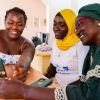
digiLab and KOYO unite to transform healthcare access in sub-Saharan Africa with responsible AI
UK-based AI company digiLab has partnered with healthtech startup KOYO to support better access to reliable healthcare in sub-Saharan Africa, beginning with a rollout in Nigeria.
The partnership brings together digiLab’s explainable, probabilistic AI and KOYO Navigate, a mobile platform that helps users understand if, when and where to seek care. The initiative responds to urgent systemic gaps, including a shortfall of over 200,000 doctors in Nigeria and an estimated 125,000 preventable paediatric deaths each year from diseases such as malaria.
KOYO Navigate launches this month in Abuja, with plans for expansion across Nigeria and into Gambia. The platform offers confidential, AI-supported consultations that are guided by medical input and tailored to the needs of users in urban and peri-urban areas, especially working women and families. By integrating local data and guidance from the World Health Organization (WHO), the system is designed to support decision-making in environments where misinformation, limited diagnostic access, and strained doctor-patient relationships are common.
digiLab’s AI, powered by the Uncertainty Engine platform, has been developed with a core focus on auditability, trust, and transparency. By leveraging uncertainty quantification, the system is able to assess how confident it is in its outputs - whether it can reliably provide a diagnosis or whether further information is needed before reaching a conclusion.
Unlike many AI systems that provide “black box” answers, digiLab’s engine explains why it has made a decision. For example, when triaging symptoms, the AI shows the reasoning process in a way doctors can validate, regulate, and standardise - addressing one of the biggest barriers to safe AI in medicine.
This approach enables safer and more reliable digital triage, with clear, expert-validated outputs that support clinical decision-making. Drawing on both regional and international health data, digiLab’s AI enhances healthcare outcomes while helping to ease the burden on overstretched healthcare systems.
Initial user feedback on the KOYO platform is positive:
-
84% rated the app 4 out of 5 or higher
-
91% said they would be disappointed if they could no longer use it
-
100% of respondents felt the app would benefit mothers
In addition to these figures, early users shared a strong sense of emotional reassurance. Several described feeling more at ease using the app compared to traditional clinical settings, especially when seeking support for sensitive issues such as maternal or mental health. The ability to open up without face-to-face pressure, combined with timely, helpful guidance, was frequently cited as a key factor in building trust and confidence.
KOYO has integrated new features for its Alpha launch, including faster response times, media upload options, and 24/7 access. It is also working with Nigeria’s National Information Technology Development Agency (NITDA) to promote digital literacy and accessibility nationwide.
To increase accessibility, the app is currently available in English, Pidgin, and French, with consultations in Hausa, Yoruba, and Igbo - the three most widely spoken Nigerian languages - due soon. Longer term, digiLab’s AI will support real-time, multilingual interactions, helping to make care guidance more inclusive and easier to understand for a wider population.
Tim Dodwell, Founder & CEO, digiLab: “This is healthcare reimagined - not replacing doctors, but scaling their reach in a way that’s locally relevant and globally significant. Our AI is auditable, explainable, and built for environments where trust is critical. By combining this with KOYO’s insight and credibility in Nigeria, we’re creating something genuinely transformational.”
Thomas Cracknell, Founder & CEO, KOYO: “We’re not following the healthcare path of high-income countries. Africa leapfrogged landlines with smartphones, and we’re doing the same with healthcare access - creating scalable, affordable, and safe systems built for our context. This is just the beginning of a long-term ambition to reshape how communities across the continent access and trust healthcare.”
This collaboration is more than a product - it's building the foundations for a new, inclusive healthcare model for Africa and beyond: one that listens, adapts, and puts people first.

















